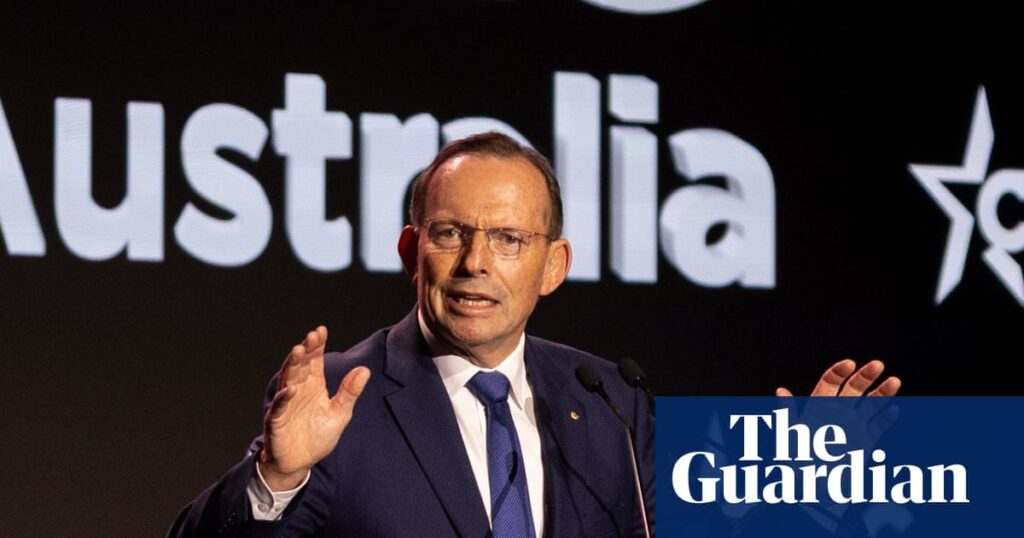
Tony Abbott, the former Australian Prime Minister, has made a passionate plea to conservatives at the Conservative Political Action Conference (Cpac) in Brisbane, urging them to give the Liberal Party “one last chance” following their disappointing performance in the 2025 election. Abbott’s call comes amidst growing concerns within the party about the rise of right-wing minor parties and internal factional disputes.
In his keynote address, Abbott apologized for the party’s recent electoral defeat and emphasized the need for the Liberals to become a more effective opposition and future government. “We must be a better opposition this time than last time, and we must be a better government next time than last time,” he stated. Abbott’s message was clear: the party needs to prove itself worthy of the public’s trust once again.
Calls for Reform and Unity
Abbott’s speech was not just a call for patience but also a demand for reform within the party. He criticized the influence of “factional warlords,” suggesting that internal power struggles have hindered the party’s effectiveness. Drawing parallels to Nigel Farage’s Reform Party in the UK, which has gained traction over traditional conservatives, Abbott argued for a “reformed Liberal party” rather than the creation of a new conservative entity in Australia.
Audience members frequently interrupted Abbott’s speech with support for other right-wing figures, highlighting the internal divisions and external pressures facing the party. Pauline Hanson, leader of One Nation, was a notable figure at the conference, underscoring the competition the Liberals face from other conservative groups.
Climate Policy and Internal Challenges
Jacinta Nampijinpa Price, recently removed from the shadow frontbench, echoed Abbott’s sentiments and urged the party to abandon its net zero climate target, a stance that resonated with the conference attendees. Price described the climate goal as “communism” and called for the Liberals to oppose what she termed “freedom-eroding nonsense.”
Price’s comments reflect a broader debate within the party about its climate policies. While Abbott criticized Labor’s climate action, labeling it a potential “political death warrant,” the opposition leader, Sussan Ley, maintained that the Coalition is still reviewing its position on net zero, despite not supporting specific climate targets while in opposition.
The Path Forward: Uniting the Right
Warren Mundine, Cpac chair and a former Labor party president, emphasized the need for conservative unity to win future elections. “We’ve got a battle; we get the conservative side of politics back together, and this is the beginning of it,” he said, advocating for cooperation among conservative groups to maximize electoral success. Mundine urged attendees to support the “brave Liberal and National party people” speaking at the conference, positioning them as future champions of the conservative cause.
Deputy Liberal leader Ted O’Brien faced heckling during his address, highlighting the internal challenges the party faces. As he criticized the current government, audience members demanded action, underscoring the urgency for the party to rebuild and present a united front.
Historical Context and Future Implications
The current struggles within the Liberal Party are reminiscent of past challenges faced by major political parties worldwide. The rise of minor parties and internal factionalism have historically led to significant shifts in political landscapes, as seen in the UK and the United States. The Liberal Party’s ability to navigate these challenges will be crucial in determining its future relevance and success.
As the conference continues, with speeches from figures like Pauline Hanson and former British Prime Minister Liz Truss, the focus remains on how the Liberal Party can adapt and reform to meet the demands of its base while appealing to a broader electorate. The coming months will be critical as the party seeks to redefine its identity and strategy in a rapidly changing political environment.
The outcome of these discussions and the party’s ability to implement meaningful reforms will likely shape the future of Australian politics, influencing not only the Liberal Party’s fortunes but also the broader conservative movement in the country.






